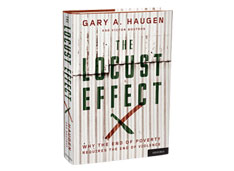Caleb is a father in Africa. He works hard as a night watchman, and he and his wife save from their small income with the dream of sending their daughter to college. But the family’s dreams are destroyed when the police arrest Caleb on a random sweep for a robbery he had nothing to do with. This is not to say that the evidence against him was flimsy; there is no evidence against him whatsoever. The police needed to show an arrest had been made, and Caleb was an easy target … because he was poor.
Once in police custody, Caleb is viciously beaten. He is shaken down for bribes. And then, he is thrown in jail and charged with a capital offense. He is given no indication of when he might have a chance to prove his innocence – and even if he were, Caleb can’t afford a lawyer to help him. His family struggles to hang on without him.
What is perhaps most stunning about Caleb’s story is not the brutality (though it certainly is brutal), the singular unfairness of it all (though it is dramatically and utterly unjust), the hopelessness (though the story is obviously devastating). No, what is most stunning is just how ordinary Caleb’s story is.
According to the United Nations, there are 4 billion people in our world who live outside the protection of law. That’s more than half the world’s population, and most of the world’s poor.
So what does it mean to “live outside the protection of law?” It means police don’t stop violent people from harming you (in fact, they may be the ones to harm you), and courts don’t restrain violent people from committing more abuse.
Put simply, for the poor in our world, violence is an everyday threat. There is no protection from those who seek to rob, rape, assault, or enslave you. Global statics make the terrible reality clear: 1 in 5 women will be a victim of rape or attempted rape in her lifetime; nearly 30 million people are held as slaves; millions are chased off their land and out of their own homes by more powerful neighbors.
For the poor, violence is a threat at home, at school, on public transportation, on the street; it’s a threat while gathering water, using the community restroom, walking to work. If you’re poor and your justice system does nothing to shield you from violent people, then the threat of violence is everywhere.
What we are calling a “plague of everyday violence” doesn’t just destroy lives. As the wisdom writer mourns, “The field of the poor may produce much food, but it can be swept away through injustice.” (Proverbs 13:23) Violence sweeps away the efforts of the poorest to lift themselves and their families out of poverty, and the efforts of the world to help them.
Take Caleb: Not only was he thrown in prison and beaten, but without the income he earned as a night watchman, his family lost their small home in a slum community and were forced to move to even more insecure housing. Caleb’s eldest daughter had to drop out of school and start working to support the family, her dreams of college devoured by predatory violence.
(Thankfully, this is not where Caleb’s story ends. My colleagues at International Justice Mission were able to come alongside him and his family, securing his release from prison and supporting his wife and children. You can read the whole story in The Locust Effect , our newest book.)
If we seek to stand with the poor, we must begin to open our eyes to this subterranean reality of violence. Unchecked violence undermines our poorest neighbors’ opportunities to thrive through education (for massive populations of poor girls, school is the most common place for sexual violence), through microloans (according to World Bank studies, people living in fear of violence must divert resources to security measures, are risk-averse, and discouraged from opening businesses), through health services (a family swept up into forced labor slavery, for example, cannot access the free health clinic in their community), and more. This is not to say that these efforts to love our neighbors are unimportant; rather, they are so important that we must safeguard them from being swept away thorough violent injustice.
A powerful first step that could be taken is ensuring that the issue of violence is included in the 2015 Millennium Development Goals. Ending the massive plague of violence that is laying waste to the poor is the urgent issue of our time. We must allow this reality to change the way that we look at poverty – starting today.
Gary A. Haugen is founder and president of International Justice Mission (IJM) — a global human rights agency that protects the poor from violence by partnering with local authorities and law enforcement to rescue victims, bring criminals to justice, restore survivors and strengthen justice systems. The largest organization of its kind, IJM has served thousands of survivors of violence. Haugen was the Director of the U.N. investigation in the aftermath of the Rwandan genocide, and has been recognized by the U.S. State Department as a Trafficking in Persons “Hero” – the highest honor given by the U.S. government for anti-slavery leadership. His work to confront violence against the poor has been featured by Foreign Affairs,The New York Times, The New Yorker, The Times of India, Forbes, U.S. News and World Report, The Guardian, and National Public Radio, among many other outlets.
Got something to say about what you're reading? We value your feedback!
